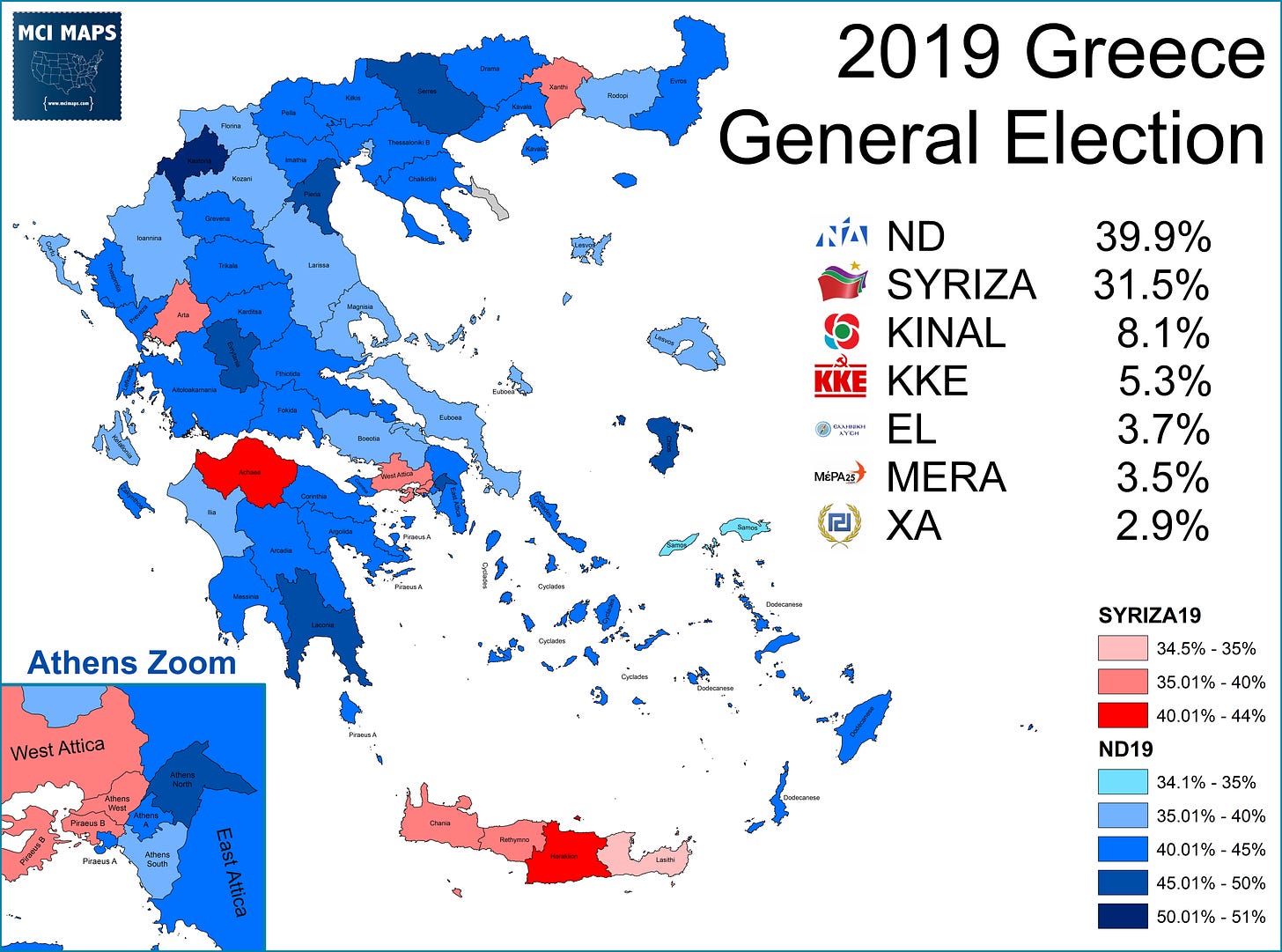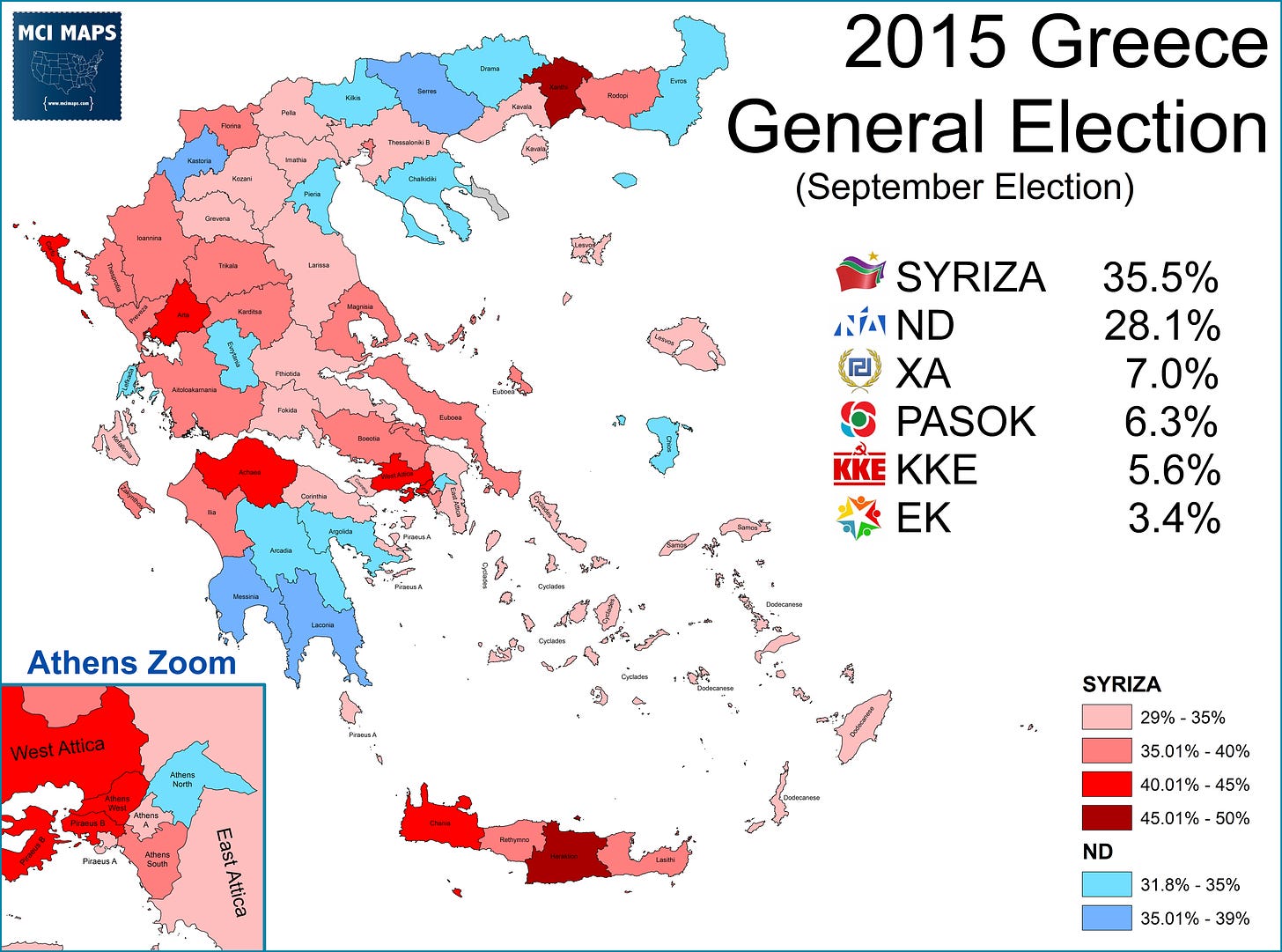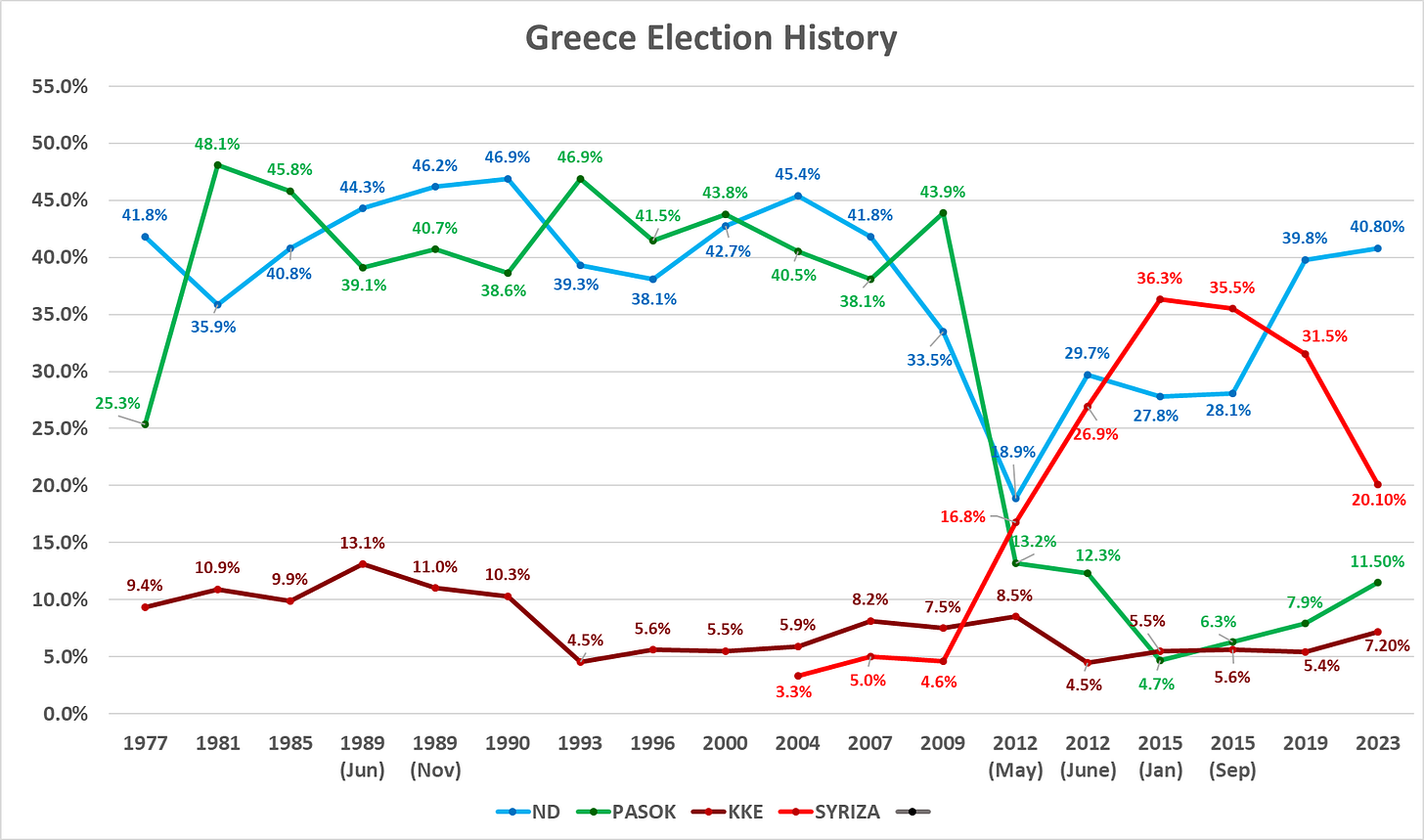Issue #110: Greece Elections are a landslide - but they may vote again in July
A bigger win for the right-of-center than expected
Yesterday, voters in Greece went to the polls to elect a new Parliament. The race was a test for the incumbent right-of-center New Democracy Party, who went into the elections with voter concerns over cost of living, corruption allegations, and the nation’s most deadly train accident in modern history. Greece has been wracked by economic turmoil since the late 2000s, as the worldwide financial crisis nearly caused the nation to tumble out of the EURO currency. While Greece now is on much more stable financial footing and has its debts under control, much of the damage from the severe austerity the country had to undertake to secure EU loans remain.
In 2019, New Democracy won control of the nation, ousting the incumbent left-wing SYRIZA party, which had come to power in 2015.
Greece’s political system has been undergoing massive changes in recent years due to the financial crisis. I think that before discussing the recent elections, its worth doing a quick look at how Greece got here politically.
Changing Greek Politics
It really cannot be stressed how much Greece’s economic crisis upended its decades-old political order. It was so drastic that I wrote a detailed history on Greek politics, covering it from the 1970s through 2019. You can read that below.
Greece’s Political Shift Article
In that article I cover the backstory to Greece’s debt crisis and the 2008 economic collapse exacerbating that issue. The worldwide crisis led to lack of investment in the nation, which was the only thing holding up its shaking debt-to-GDP ratio. It turned out Greek leaders had been hiding the amount of debt they had, and this led to the incumbent New Democracy Party losing power to the left-of-center PASOK in 2009.
To be clear, all sides of the Greek political order shared a bit of blame for this. PASOK, however, came into power when the unemployment rate of the nation was already 10% and bound to get worse. In order to get loans from the EU, Greece had to undergo severe and crippling austerity measures. The left-wing completely abandoned PASOK as time went on; with Prime Minister George Papandreou eventually relinquished power in 2011 for a grand coalition of PASOK, New Democracy, and the ‘Popular Orthodox Rally’ party - with outsider Lucas Papademos leading the nation.
Loans kept the nation afloat, but it was in such a financial crunch that in early 2012, the Finance Ministry warned cash for paychecks would have run out by June. Snap elections were called to try and elect a government.
Now it should be noted that before this, the nation’s politics was dominated by PASOK and New Democracy. The KKE (Communists) being a perpetual third party. Each elections was largely a fight between PASOK and ND. The nation uses proportional representation with a 3% minimum to enter parliament.
The first round of 2012 elections, however, saw establishment support collapse. PASOK fell to 3rd and the left-wing SYRZIA party surged to 2nd. A litany of other parties passed the 3% threshold to enter parliament.
With Greece’s proportional representation system, the parliament was filled with parties with no clear mandate. No agreed coalition could be formed, which led to June elections which saw ND and SYRIZA gain more ground.
Eventually a grand coalition of ND, PASOK, and left-wing DIMAR was formed. SYRIZA opposed the austerity required by the bailouts and refused to take part. Meanwhile, Golden Dawn (XA) - a neo-fascist party - got as high as 7% of the vote.
Again I am glossing over a TON of details to keep this short, so I implore you to read my larger article for more on this chaos.
In 2015, elections were called. With the nation feeling the horrible brunt of austerity, SYRIZA easily surged into first and won the elections.
Aléxis Tsípras became Prime Minister after forming a coalition with ANEL, which was a conservative Eurosceptic party. This was basically a coalition against the heavy-handed austerity demands from the EU. Tsípras’ efforts to amend bailout deals was largely unsuccessful, and the nation was still years from being free of needing cash. The situational was so dire that as negotiations went on, a four month loan was agreed, while restrictions like only taking out 60 dollars from the ATM a day was implemented.
After failing to secure a better deal, Tsípras took the latest agreement, which meant more austerity but also included a loan package that placed Greece on a path to getting on sound financial footing within a few years, to a vote. Tsípras called for a no vote, which succeeded. However, the EU would not budge and after Greece missed an IMF payment, had to eventually agree to the bailout conditions. Tsípras resigned and called a snap election, letting voters decide if he should remain. His party won and he led the nation through the terms of its bailout agreement.
SYRIZA was put in a bad position by the EU, but ultimately the nation would come out of its debt crisis and is on more stable footing. The 2019 win for New Democracy seemed to indicate a new political order for Greece, with SYRIZA surpassing PASOK (which ran with the left-wing KINAL party in 2019) as the major left-wing alternative.
I covered that 2019 election in my main article. One issue that also hurt SYRIZA was left wing off-shoot parties that felt betrayed by the bailout agreements. I actually give the SYRIZA a good deal of credit for dealing with an impossible hand it was dealt. My anger at the crippling and cruel austerity lays more with the richer nations that demanded it.
The question then on my mind was, how would Greece’s next election go? It appeared SYRIZA would be the locked-in second choice. PASOK merged with KINAL in 2019, but they were still an small 3rd or 4th party. Could they rebound?
The 2023 Elections
Polls leading into this year’s elections indicated that ND would be favored, but the incumbents have been hit by controversy. The massive train crash revealed the nation’s infrastructure is in disrepair, while the revelation that the security services were spying on opposition parties caused a major scandal. Trust me, New Democracy has plenty of problems.
However, what ND had going for them was a promise of stability. The party pledged to reboot the social services gutted during austerity and warned against the unstable nature of coalition governments. Do the nations proportional representation system, a coalition government has been and looked like a real possibility. If SYRIZA had passed ND and wanted to form a government, they almost sure would not have held a majority of seats and needed a coalition. New Democracy advocated for giving them, the lone right-of-center party (of serious strength) a chance to form a majority government to ensure stable leadership.
In the end, despite polls predicting a close result, the New Democracy Party finished the campaign with a massive 20%+ margin win.
Five parties earned enough support to enter parliament. The KKE rose a few points, while PASOK-KINAL's new alliance rose 3 points.
Quick Tangent
I gotta talk about this part of the election results.
Greek Solutions (EL) is a far-right and ultranationalist party. They are definitely the most right-wing party in parliament now that Golden Dawn as been disbanded. They got 4.5%, up just a bit from last time. One note though, as part of their anti-immigrant and anti-Turkey views, they favor an ELECTRIFIED fence on the Greece-Turkey border. That border is on the Evros electoral district - which is also EL’s strongest showing - 8.7%.
Below is EL’s performance. Note this basically is a scale from 0-9%, but it shows strong geographic block in the Northeast.
This stands out to be because EL was a firm opponent of the agreement with the nation of “North Macedonia” - which saw Greece end its opposition over the nation joining the EU and NATO due to disputes over the name “Macedonia.”
Long story short, Greece considers itself the decedents of the old Macedonian empire and peoples, and they didn’t like “The Republican of Macedonia” emerging after Yugoslavia broke up. The final agreement led to the name “North Macedonia” being accepted as a compromise. I wrote about the agreement, the historic dispute, and Macedonian politics in this article.
Article on Macedonia Election and Name-Change
The Balkans are always interesting to write about.
The position of the EL and others who opposed Greece agreeing to the new name was that the name “Macedonia” shouldn’t be used at all. This holds more water with the small minority of residents in the Northern Greece region who consider themselves ethnically Macedonian. I believe that EL capitalized with some of these voters thanks to their feverish opposition to the deal that was struck.
Long story short this all stems from the question of a name being a nation or an ethnicity. A discussion guaranteed to piss off countless people. If you are confused (don’t blame you) - then read that Macedonia article I wrote. Any discussion about this region of the world involves at least generally grasping thousands of years of often-bloody history.
Tangent Over
Ok back to the results.
SYRIZA lost ground across the nation, except for one district. In some areas they lost well over 10% from the 2019 cycle.
PASOK, meanwhile, made modest gains fairly evenly across the nation.
The question on many minds is what will happen with the left-wing in Greece next. SYRIZA knows this result is bad, as it could cause former PASOK backers to reconsider their old party. Here is how party share history looks after this vote.
That red drop and green rise should be very concerning for SYRIZA. This might get worse for them too, as it seems likely Greece could be going to the polls again soon.
A July Election?
The New Democracy Party absolutely crushed its opposition, so why are we talking about possible new elections? The answer is that despite winning by over 20 points, ND is still a handful of seats shy of a majority, sitting at 145 out of 300.
That is because when SYRIZA was in power, they passed a new election system. Before this year, the parliament was elected under proportional representation, but the top party got a bonus of 50 additional seats. You needed 3% to make it into parliament. This ensured most parties had workable majorities. SYRIZA got rid of this while in office; ending the bonus seat provision. However, that change could not come into effect until after the next schedule election (which prevents a party from rigging the system for their benefit). So the 2019 vote continued under the old win-bonus system, which ND got when they won that race.
This was the first election that bonus was gone, meaning it would be very unlikely anyone would get a majority of seats. Estimates are that it would take a party getting 46% of the vote to get a majority (after the parties under 3% are eliminated). However, in 2020, ND passed their own election changes that brought back the win bonus, but with a sliding scale, rather than a flat 50 seat extra. Again, that change could not happen until one election had passed - aka the one we just had.
But guess what? Since no party has a majority, the ND can easily refuse a coalition government discussion and a snap election could be called. It seems very likely this will happen. That snap election would be under the NEW reforms that ND passed in 2020, brining back the win bonus and making a majority much more likely. You can read more about this race and that likely snap election here.
Here is more from the New York Times on this likely snap election.
At his victory party, ND leader Kyriakos Mitsotakis made his views on a likely new election clear.
The people wanted the choice of a Greece run by a majority government and by New Democracy without the help of others,
“We kept the country upright and we’ve laid the foundations for a better nation,” he said. “We will fight the next battle together so that at the next elections what we already decided on, an autonomous New Democracy, will be realized.”
Mitsotakis is counting on the argument for stability as a key selling point to the nation’s voters. The prospect of a new election has been present for some time, especially when polls initially predicted a close race with no one likely close to a majority. I am no Greece political expert, but a big ND win in a snap election, driven by voters eager for stability as they continue to slowly move out of the long economic drama, seems likely to me.
Perhaps a bigger question I have is what happens with SYRIZA and PASOK. Could PASOK regain more of its old voters, and better position itself as the best left-wing alternative? I cannot imagine either party is looking to July thinking they can win. Rather, they may eye July to see who has the right to challenge New Democracy in the next few years.















Interesting story. Some of us followed the Syriza story for years hoping for a positive ending. It looks almost like a no good deed goes unpunished tale now, especially in politics.